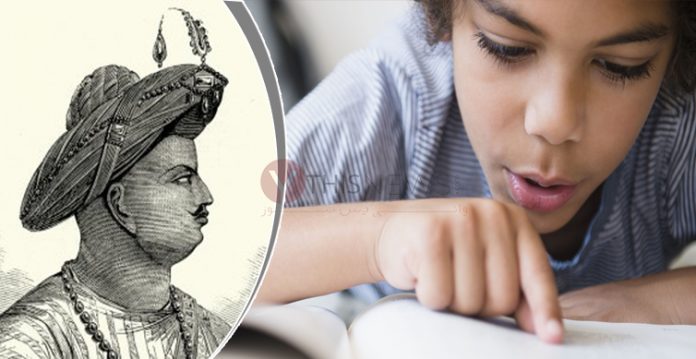In a bid to reduce the school syllabus by 30% to compensate for the time lost due to the coronavirus pandemic, the Centre had suggested dropping of certain chapters for the same.
Karnataka government has truncated entire chapters on Tipu Sultan, Islam, Christianity, and even a part of the Constitution.
The chapter on Tipu Sultan has been dropped from the social studies, specifically, the history subject’s textbook for Class 7 graders. This also includes lessons on Haider Ali (Tipu Sultan’s father), historically important monuments and places within the city of Mysuru, and the administration of Commissioners.
The document states that the reason behind the “limitation” in the chapter is that these units “do not require a separate class” as they can be presented through “assignments and PPTs”. This is the case with chapter 5 of Class 7.
As for Class 10, chapter 4 of the social studies textbook has seen an elimination of the units on the father-son duo, the Rebellion of HalagaliBedas, and KitturChenamma-Rayanna. The Karnataka Textbook Society website says that these must be introduced by ‘projects and chart preparations’ rather than actual classroom teaching.
Tipu Sultan was the ruler of Mysore from the year 1782 to 1799. He was killed in the Anglo-Mysore war of 1799 after an insider worked for the British and helped them win. The Sultan had previously won many battles against the British enemies to save his motherland. His residence, the Tipu Sultan Summer Palace still stands strong in the city of Mysore and is a popular tourist spot.
“The chapter on Tipu Sultan for Class 7 has been dropped to reduce the syllabus by 30 percent for this academic year due to delay in reopening of schools due to no let-up in coronavirus spread,” Karnataka Text Book Society Director MaddeGowda told reporters here.
“As Class 7 students would have read Tipu in Class 6 and will read more on him again in Class 10, dropping it for them in this academic year will not be a loss to them,” told Gowda as the society has planned to retrieve the chapter “Tiger of Mysore” (The title given to Tipu Sultan) for class 6th and 10th.
“We have not deleted study matter on Tipu or Hyder Ali. The changes were made by subject experts in whose work we do not meddle. They have changed it on priority, as the academic year has been reduced to 120 days from 220 working days,” Gowda added.
BaraguruRamachandrappa, a notable writer led a high-end committee that had advised the state government in November 2019 against dropping the units on Tipu from history textbooks. However, many BJP leaders had encouraged the truncation.
An official of the Karnataka education department said that the step has been taken to reduce the load on the students who do not have much time to study the entire syllabus in much less time, assuming that the school reopens on September 1st. The revamped syllabus has been made public on the Department of State Education Research and Training (DSERT) website.
Moreover, the state has also dropped “entire” lessons on Christianity and Islam. These included topics on Prophet Mohammed and Jesus Christ. These chapters have been removed from the 6th standard syllabus saying that students will be studying it in the 9th standard. When we see the changed syllabus for Class 9th, it is mentioned that these very same chapters won’t be taught as the students have “already studied” them in the 6th standard. This confusion and elimination of vital subjects did not well with the opposition party and experts who say that the government is trying to “meddle” with the history of India, forcing them to only learn the things which they consider is correct, things and incidences in the history which align with their thought-process and understanding only. Congress has also accused the BJP government of “playing communal politics” by interfering in the education sector as well, trying to change history itself.
Apart from this, important chapters pertaining to the Indian constitution, its makers, and its process of formation, directive principles of state policy, etcetera have also been erased from the syllabus. The opposition has raised questions as to why the government has touched vital chapters as if they aren’t important enough to be learnt by the students.







